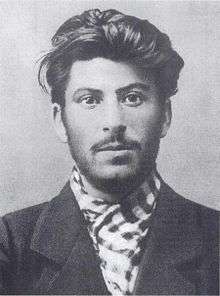Besarion Jughashvili
| Besarion Jughashvili | |
|---|---|
 | |
| Born |
Besarion Vanovis Jughashvili ბესარიონ ჯუღაშვილი Виссарион Иванович Джугашвили c. 1850 Didi Lilo, Tiflis Governorate, Russian Empire |
| Died |
25 August 1909 (aged 59) Tbilisi, Russian Empire |
| Occupation | Cobbler |
| Spouse(s) | Ketevan Geladze |
| Children |
Mikheil Giorgi Ioseb |
| Parent(s) | Vano Jughashvili |
Besarion Vanovis Jughashvili (Georgian: ბესარიონ ჯუღაშვილი; Russian: Виссарион Иванович Джугашвили) (1849 or 1850 – 25 August 1909)[1] was Joseph Stalin's father. He often went by the nickname "Beso". He was a cobbler by trade, though later in life he slid into alcoholism and became a vagrant. His wife and Stalin's mother was Ketevan Geladze.
Family and early life
Besarion Jughashvili was the paternal grandson of Zaza Jughashvili from the village of Geri, north of Gori. In the mid-19th century, Zaza took part in a peasant uprising in Ananuri, a small county seat near Ger on the Aragvi River. The uprising was crushed by Imperial soldiers, and Zaza was captured along with nine other rebels. Zaza escaped and hid in Gori, where he was recaptured and remanded as a serf to Prince Eristavi. He became involved in another uprising on the Eristavi estate. It is unknown who his wife was, or the exact number of children he sired.[2] Vano Jughashvili, Besarion's father, tended the vineyards of Georgian Prince Badur Machabeli in the village of Didi Lilo (ka) (დიდი ლილო). Besarion was born into an Orthodox Christian serf family from the village of Didi Lilo in Tiflis Governorate, most likely in 1850. Besarion had a brother named Giorgi who was murdered by bandits.[3]
Later life and Stalin
According to the Arsoshvili family (Jughashvili's relatives and longtime residents of Didi Lilo), Jughashvili (nicknamed "Beso") couldn't afford paying a three-ruble tax and had to move to Gori in search of employment.[3]

_Ivanovich_Jughashvili's_Grave.jpg)
In Gori, he lived in a house that belonged to the Kulumbegashvili family. Here, Jughashvili found a job as a cobbler and married Ekaterina (Keke) Geladze on 30 May 1872. He was a polyglot, being fluent in Georgian, Russian, Turkish and Armenian.[3] Their first two children (Mikhail and Giorgi) died as infants in 1875 and 1877, aged less than a year, the latter from measles. Beso soon developed a severe drinking problem. Stalin's French biographer Souvarine speculated that Stalin's birth defects, notably his adjoining two toes, were probably due to his father's alcoholism.[4] Jughashvili eventually opened his own workshop, and for a time he and his family were prosperous and happy, until his drinking problem resurfaced. He subsequently became very abusive toward his wife and son, at one point having tried to strangle Keke.[3] His ability to work also suffered, to the point that his workshop was kept alive only by his apprentices. Although Besarion wanted his son to follow in his footsteps and become a cobbler, his mother instead had Joseph enrolled in school to be educated for the Orthodox priesthood. This enraged Besarion; in a drunken rage, he vandalized a local tavern and attacked the village police chief. For this he was expelled from Gori. He kidnapped Stalin from the Gori school so often that Stalin's maternal uncles had to smuggle him in.
He moved to Tbilisi, where he found work at the Adelkhanov Shoe Factory, while his wife and son stayed in Gori. When his son entered an Orthodox seminary in Tbilisi, Beso made an unsuccessful attempt to remove him and teach him the cobbler's trade instead. He turned up once demanding three rubles from his son as he was moving away. Stalin threatened to call the watchman if he didn't leave, so he went.[5] Stalin still visited his father with his mother's cousin while at the seminary. Beso would give him leather boots as presents.
In January 1900, Stalin was imprisoned for the first time because his father had not paid his taxes for his village. Stalin's friends paid it for him.[6]
In May 1901, Beso met his son for the last time. Soso, as he was called, was organizing a strike in the Adelkhanov shoe factory where Beso worked. Beso asked his son, "Why are you coming here?" "To address these fellows," Stalin replied. Beso then said, "Why aren't you learning a trade?"[7]
In May 1902, he accidentally met his ex-wife on her way to visit Stalin in Batumi prison. He shouted, "Stop or I'll kill you! He [Stalin] wants to turn the whole world upside down. If you hadn't taken him to school he'd be a craftsman, now he's in prison. I'll kill such a son with my own hands, he's disgraced me." A mob protected her from him. She never saw him again.[8]
Besarion died on 25 August 1909 in Mikhailovsky Hospital in Tiflis, suffering from tuberculosis, colitis and chronic pneumonia.[3] He is buried in Telavi, Georgia in a pauper's grave. He had made no effort to contact his son.
References
- ↑ Book in Georgian. nplg.gov.ge. 2010
- ↑ Smith, Edward Ellis (1968) The Young Stalin: the early years of an elusive revolutionary, Cassell & Company
- 1 2 3 4 5 Montefiore
- ↑ Trotsky, Leon (1947) Stalin: An appraisal of the man and his influence, edited and translated from the Russian by Charles Malamuth, London: Hollis and Carter.
- ↑ Montefiore, 47
- ↑ Montefiore, 64
- ↑ Montefiore, 66
- ↑ Montefiore, 88
Bibliography
- Simon Sebag Montefiore (2007). Young Stalin. Phoenix. ISBN 978-0-297-85068-7.

